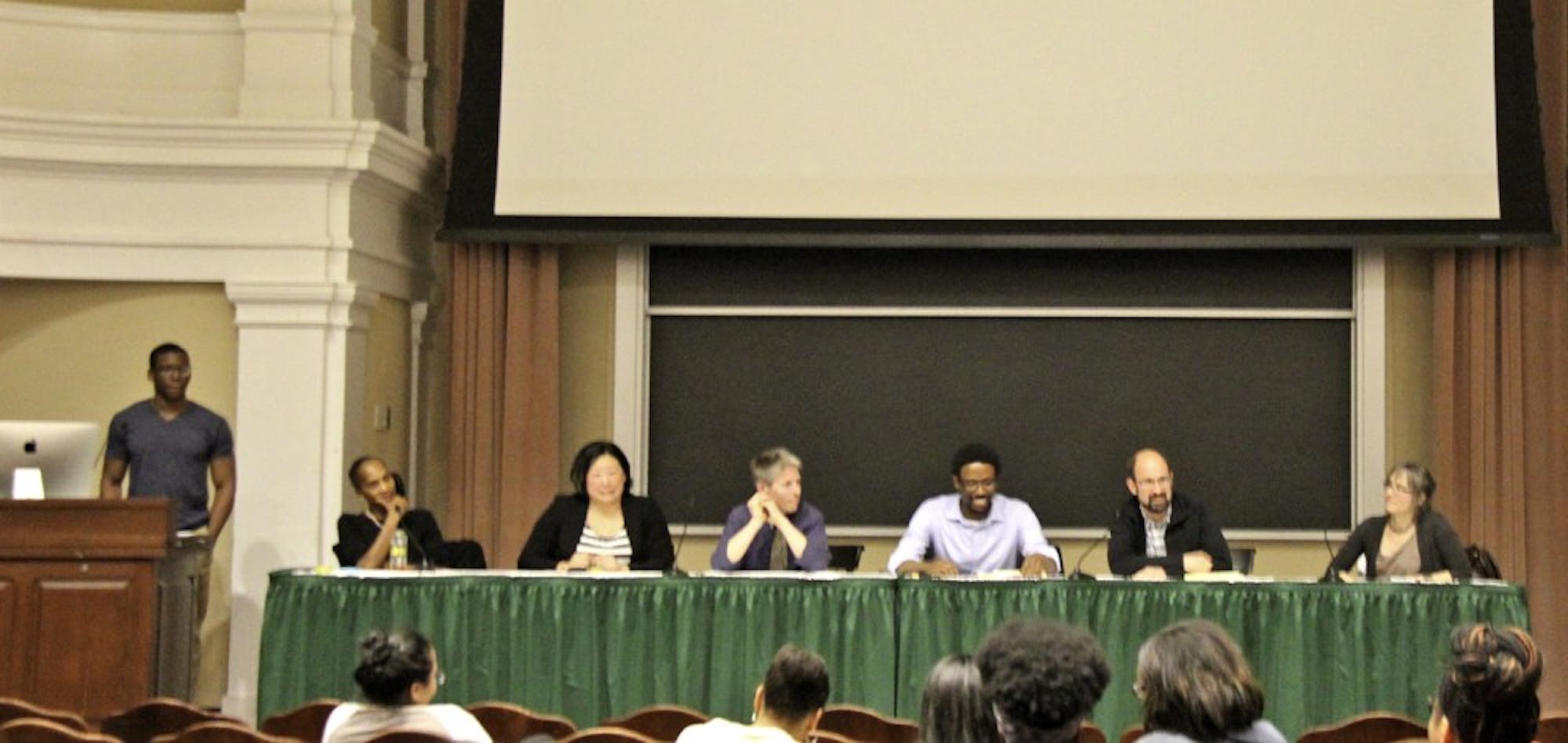Filling half of Dartmouth Hall 105, the audience at yesterday’s panel discussing issues of faculty diversity was comprised mainly of black students.
“This room doesn’t look like Hanover,” panelist and vice president of institutional diversity and equity Evelynn Ellis said, to laughs from the audience, later adding that underrepresentation of minority faculty can be disadvantageous to all students, not just students from underrepresented groups.
The faculty diversity panel, which was hosted by Dartmouth’s chapter of the National Association for the Advancement of the Colored People Panel, was held in an effort to increase the level of transparency of recruitment and retention processes and generate campus discussion on the nature of faculty diversity at the College.
Ellis said that a lack of faculty diversity at a higher-education institution will not effectively prepare students for the diversity they will face in professional world.
“I think the general student body needs to get more interested in this,” Ellis said.
According to the 2014 Dartmouth College Fact Book, 82 percent of College faculty members are white, while two percent are black or African American, five percent are Asian, five percent are Hispanic or Latino, three percent are international and one percent is American Indian/Alaska Native. Fifty-nine percent of faculty members are male and 41 percent are female.
Dartmouth NAACP chapter president Kevin Gillespie ’15 said that a “mass exodus” of faculty of color has occurred in the past few years, a sentiment echoed by panelists. English professor Aimee Bahng, one of the panelists, noted that the African and African American studies program recently lost its chair.
Gillespie commented that the organizing committee aimed to feature professors from a wide array of departments, as well as administrative staff, all of whom are committed to increasing diversity and support for underrepresented groups on campus.
The panel began with a video released by NAACP at Dartmouth last fall, which interviewed students about their views on faculty diversity at the College. Dartmouth NAACP Vice President Jonathan Diakanwa ’16 said that with this panel discussion, the NAACP wanted to continue discussion on the faculty side of the issue that the video portrayed and to encourage collaboration between students and faculty.
Students in the video voiced frustration at the lack of diverse faces in professor positions.
Tramon McZeal Jr. ’16, who was featured in the video, said, “I know that some of my most valuable experiences with professors have been [with] professors that look like me, professors that talk like me, professors that act like me.”
Diakanwa, who moderated the event, asked the panelists a series of questions about faculty diversity. Topics covered included the College’s specific struggles with recruiting and retaining faculty of color, what Dartmouth as an institution and its students can do to support faculty and staff of color and steps students and faculty can take toward building a community together.
The moderated discussion was followed by a question and answer session with the audience, which featured questions about specific actions students can take to more actively engage with faculty and administrators on the issue of faculty diversity, as well as more general discussion about underrepresented groups’ struggles in the Upper Valley and in higher education at large. Mathematics professor Craig Sutton emphasized that Dartmouth’s location in a homogenous geographical area is not an excuse for the strive for diversity to be any weaker.
The panelists all agreed that the College’s faculty of color often bear a heavier load of mentorship. Comparative literature professor Michelle Warren said this mentorship, which includes one-on-one support and involvement in student groups, should be valued more within academic departments.
Warren also emphasized that diversity should be included in Dartmouth’s self-evaluation as an institution.
“A failure of diversity is a failure of excellence,” she said.
The panelists had a range of advice for students on contributing to improved faculty diversity. Ellis repeatedly urged students to engage the professors with whom they feel closest, echoing Gillespie and Diakanwa’s point on the influence of faculty members in hiring their peers. Asian and Middle Eastern languages and literatures professor Jonathan Smolin added that institutional guidelines can influence the hiring process as well.
Liza Wemakor ’18 said that the discussion would provide perspectives from the faculty, and such discussions are important because many students on campus do not engage with the issue of faculty diversity.
Gillespie said he thinks the panel, in the context of “Moving Dartmouth Forward,” occurred at a pivotal time for the College and hopes that such events will encourage students and administrators to pay more attention to faculty diversity.
Last night’s panel occurred a few weeks before the release of the Affirmative Action Plan, which, according to Ellis, will be released around the end of the month. The plan is produced by the office of institutional diversity and equity and is submitted to the College President and Board of Trustees for approval before being distributed to other College faculty. The plan features statistics on the demographic makeup of all of the College’s employees.




